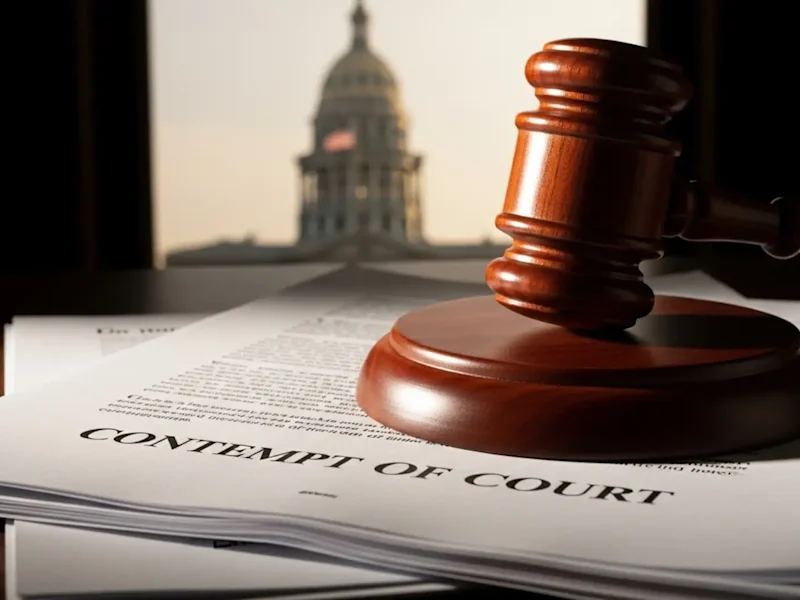Court Orders Aren't Suggestions—Here's Why That Matters
Most people assume court orders are suggestions that carry weight but leave room for interpretation. They figure a few days late on child support won't matter, or missing one exchange won't trigger consequences.
The reality? Colorado judges view court orders as binding legal directives, and violating them - even once - can land you in contempt of court. The gap between what people assume about court order enforcement and what actually happens in Colorado courtrooms costs people their freedom, their money, and sometimes even their parenting time.
What makes contempt of court in Colorado different from what most people expect? First, willfulness matters tremendously - the court must determine you knowingly and intentionally violated the order, not just that you failed to comply. Second, Colorado recognizes two distinct types of contempt with different purposes: civil contempt aims to force compliance while criminal contempt punishes disrespect to the court itself.
The consequences go beyond fines to include potential jail time, loss of parenting time, and permanent damage to your credibility with the judge. Perhaps most surprisingly, in civil contempt cases, once the violation is shown, the burden of proof shifts - you must prove why you couldn't comply.
Why These Cases Hit Different Than You'd Expect
The difference between a technical violation and a contempt finding often comes down to whether the judge believes you deliberately ignored their order.
Colorado courts don't care much about excuses after the fact - they care about whether you made genuine efforts to comply or simply chose not to follow through.
Family law judges in particular have seen every excuse imaginable for missed child support payments, violated parenting time schedules, and ignored protective orders. They've developed finely-tuned instincts for separating legitimate inability from willful defiance.
What You'll Find in This Guide
Facing a contempt citation doesn't automatically mean you're guilty, but it does mean you need to understand the system you're navigating. This guide covers the specific legal definitions and types of contempt under Colorado law, real-world scenarios that lead to contempt citations in family law cases, actual penalties and long-term consequences you could face, viable defenses that work in Colorado courts, and how the contempt process unfolds from filing to resolution.
Understanding Contempt of Court Under Colorado Law
Colorado defines contempt of court through Rule 107 of the Colorado Rules of Civil Procedure, which covers everything from courtroom disruptions to violations of court orders.
The statute casts a wide net, but family law cases typically involve indirect contempt - violations that occur outside the courtroom rather than in the judge's presence. Understanding where the legal lines are drawn helps you recognize when you're approaching dangerous territory or when someone else has clearly crossed it.

The Legal Framework Colorado Courts Apply
Colorado law distinguishes between different forms of contemptuous behavior, each triggering different procedures and consequences. Judges don't get unlimited discretion - they must work within established legal frameworks that protect individual rights while enforcing court authority.
Direct contempt involves disruptive behavior that occurs in the courtroom while court is in session, witnessed by the judge. Indirect contempt, on the other hand, refers to violations of court orders that occur outside the courtroom, requiring proof through evidence and testimony.
The distinction matters because direct contempt can be punished immediately, while indirect contempt requires a hearing.
Civil contempt actions are designed to coerce compliance with court orders, where punishment ends when the person complies. Criminal contempt involves punishments imposed to vindicate the court's dignity when someone deliberately disrespects judicial authority.
Courts can also impose remedial sanctions aimed at achieving compliance, such as paying overdue support or following parenting schedules, or punitive sanctions - fixed penalties like jail time or fines that punish past misconduct without offering a path to avoid consequences.
How Courts Determine Willfulness
The concept of "willfulness" sits at the heart of most contempt cases. Colorado courts need more than just proof that you violated an order - they need evidence that you did so knowingly and deliberately. This requirement protects people who genuinely couldn't comply from being punished for circumstances beyond their control.
Knowledge of the order comes first. You must have known about the court order you allegedly violated, which means ignorance can actually be a defense. The court also examines whether you had the present ability to follow the order at the time you failed to do so - this is where financial circumstances, medical conditions, or other practical barriers become relevant.
Beyond ability, prosecutors or the moving party must show you consciously chose not to comply rather than being prevented by circumstances outside your control. A pattern of repeated violations strengthens the case for willfulness, while isolated incidents may suggest different causes like misunderstanding or changed circumstances.
Real-World Examples of Contemptuous Conduct
Colorado family law cases produce predictable patterns when it comes to contempt citations. Judges and attorneys see the same types of violations repeatedly, which means they've developed clear expectations about what constitutes contemptible behavior versus honest mistakes.
Repeatedly missing child support payments despite steady employment and income
Refusing to return children after parenting time or denying the other parent their court-ordered time
Violating protective orders by contacting the protected party through any means
Hiding assets or failing to transfer property as ordered in the divorce decree
Making major decisions about children without consulting the other parent when joint decision-making is ordered
Refusing to attend court-ordered parenting classes, therapy, or drug testing
Types of Contempt Cases in Colorado Family Law
Not all contempt situations follow the same playbook. Colorado recognizes fundamentally different types of contempt that trigger different procedures, require different burdens of proof, and result in different consequences. Understanding which category your situation falls into determines everything from whether you need a lawyer to what defenses might work in your case.

Civil Contempt: Forcing Compliance
Civil contempt focuses on getting the non-compliant party to start following court orders rather than punishing them for past violations. The goal is remedial - bringing someone into compliance - which means the penalties can be lifted once they do what the court ordered in the first place. This is the most common type of contempt in family law cases.
The burden of proof in civil contempt cases uses the preponderance of evidence standard, meaning the moving party only needs to show it's more likely than not that you violated the order.
Courts must also find you presently capable of following the order before imposing civil contempt - past ability isn't enough if you genuinely can't comply now. The court typically sets specific "purge conditions" - actions you can take to clear the contempt and avoid penalties.
In successful civil contempt cases, courts routinely order the non-compliant party to pay the other side's attorney fees, recognizing that the violation forced them to seek court intervention.
Judges often set review hearings to monitor whether you're actually following through with the required actions, ensuring compliance rather than just issuing orders that get ignored again.
Criminal Contempt: Punishing Past Misconduct
Criminal contempt shifts focus from future compliance to punishing past disrespect for court authority. Colorado treats this as "quasi-criminal," which means higher standards of proof apply and defendants get additional constitutional protections. These cases are less common in family law but carry more serious immediate consequences.
The burden of proof in criminal contempt matches criminal cases - beyond reasonable doubt - protecting against wrongful convictions. Unlike civil contempt, punishment doesn't depend on future compliance.
You serve the time or pay the fine regardless of what you do afterward, since the sentence is fixed rather than conditional. Defendants facing potential jail time have the right to an attorney, including appointed counsel if they can't afford one.
Criminal contempt differs from civil contempt in another important way: the court cannot order criminal contemnors to pay the other party's legal expenses. The focus is entirely on punishing deliberate disrespect to the judicial system itself rather than achieving practical compliance with specific orders.
Common Contempt Scenarios in Family Court
Certain situations dominate Colorado's family court contempt dockets. These recurring scenarios have developed established precedents and predictable outcomes that help attorneys advise clients about likely results.
Child support arrears: Failing to pay ordered support despite having income or assets available to make payments
Parenting time violations: Repeatedly denying the other parent their court-ordered time with the children or refusing to return them
Property division non-compliance: Refusing to refinance the house, transfer accounts, or divide assets as ordered in the decree
Spousal maintenance defaults: Stopping alimony payments without seeking proper modification through the court
Decision-making violations: Making unilateral choices about children's education, medical care, or religion when joint decision-making is required
Restraining order breaches: Any contact with a protected party, including through third parties, social media, or showing up at their location
Potential Penalties and Long-Term Consequences
The numbers tell part of the story, but the real impact of contempt findings extends far beyond the courtroom. Colorado courts can impose serious immediate penalties including jail time up to six months and substantial fines.
What catches most people off-guard isn't the initial punishment - it's how a contempt finding follows them through future proceedings and shapes how judges view their credibility going forward.
Immediate Penalties Courts Can Impose
Colorado judges have broad discretion in crafting contempt sanctions, limited mainly by statutory maximums and constitutional protections. The specific penalties depend on whether the contempt is civil or criminal, how egregious the violation was, and whether this is a first offense or part of a pattern.
Jail time represents the most serious consequence - up to six months incarceration for each contempt count, sometimes with the ability to purge by complying with the original order. Fines can range from hundreds to thousands of dollars depending on the violation's severity.
In civil contempt cases, courts routinely order the violator to reimburse the other party for attorney fees and costs incurred in bringing the contempt action.
When parenting time violations occur, judges may order make-up parenting time - compensatory time with children to offset what the other parent lost due to the violations. Courts sometimes require bonds or security, forcing the contemnor to post money guaranteeing future compliance with court orders.
In serious or repeated cases, judges may modify the underlying orders themselves, changing custody arrangements, parenting time schedules, or other provisions when violations demonstrate an inability to follow existing orders.
How Contempt Findings Affect Future Court Proceedings
A contempt finding doesn't disappear when you pay the fine or serve the time. It becomes part of your permanent court record and shapes how judges evaluate your credibility in every future proceeding. Colorado family court judges have long memories, and they communicate with each other about parties who repeatedly ignore court orders.
The credibility damage alone can be devastating. Judges give less weight to your testimony and arguments in future hearings after you've demonstrated disregard for court orders. In custody-related matters, a history of contempt - especially involving parenting time violations - can lead to reduced time with children or even supervised parenting time requirements.
Courts impose more detailed monitoring requirements and stricter conditions on parties with contempt records, knowing they've proven unreliable in following orders.
Future violations carry progressively harsher penalties when you have a record of prior non-compliance. Many licensed professions require disclosure of contempt findings, potentially affecting your career opportunities.
For non-citizens, criminal contempt involving domestic violence or protective order violations can trigger immigration consequences including potential deportation.
The Financial Reality of Contempt Cases
Beyond court-imposed fines and attorney fees, contempt proceedings create financial burdens that surprise many people. The process itself costs money even before any penalties are imposed, and those costs multiply if you need multiple hearings or appeals.
Defending against contempt requires legal representation, typically costing several thousand dollars minimum just for your own attorney fees.
Court costs and filing fees add administrative expenses that accumulate quickly across multiple filings and hearings. You'll likely lose wages for time off work attending court appearances, especially when contempt hearings get continued multiple times - and in Colorado family courts, continuances happen frequently.
Actually doing what the court ordered may itself require significant money - paying down support arrears, completing required programs, or making other expensive changes.
The collateral consequences extend even further: higher insurance rates, difficulty securing housing, loan denials, and other indirect financial impacts that persist long after the contempt case closes.
Defending Against Contempt Citations
Getting served with a contempt citation doesn't mean you're automatically guilty. Colorado law provides several legitimate defenses that can defeat contempt allegations even when you technically violated the order's terms. The key is understanding which defenses actually work in Colorado courts versus which arguments judges have heard and rejected thousands of times. Smart defense strategy starts with honest assessment of your situation and builds from there.

Inability to Comply: The Most Common Defense
Proving you couldn't comply with the court order - not that you simply chose not to - provides the strongest defense against contempt in most cases.
Colorado courts recognize that circumstances sometimes genuinely prevent compliance despite good faith efforts. The burden shifts to you to prove inability once the other side establishes the violation occurred.
Job loss and reduced income can support inability to pay support, though you must show you actively sought other work and didn't just sit idle.
Medical emergencies that prevented compliance work as defenses when documented through medical records and physician testimony. Being incarcerated prevents compliance with many obligations, though courts may still find contempt for the conduct that led to jail in the first place.
Events truly beyond your control - like natural disasters or being hospitalized during a scheduled parenting time exchange - fall under force majeure exceptions. In some cases, proving you genuinely didn't know about the court order or its specific terms can defeat contempt, since knowledge is a required element.
Challenging the Underlying Order's Validity
Sometimes the problem isn't your compliance - it's that the order itself has issues that undermine the contempt case. Colorado allows defendants to challenge whether a valid, enforceable order actually exists before addressing whether they violated it.
Orders must be clear and specific enough that a reasonable person understands what's required - ambiguous order language can defeat contempt. Courts also need proper authority over you to enter enforceable orders, so lack of personal jurisdiction can be raised as a defense.
While illegal orders aren't enforceable, you typically need to seek modification through proper channels rather than just ignoring them. You can also show the order you allegedly violated was no longer in effect when the violation occurred because it expired or was superseded by newer orders.
Proving the Violation Wasn't Willful
Even when you clearly violated an order and had the ability to comply, defeating the willfulness element can prevent a contempt finding. Colorado requires evidence that you knowingly and deliberately chose non-compliance rather than making honest mistakes or misunderstanding requirements.
Good faith misunderstanding of ambiguous order language can work when your interpretation was reasonable even if incorrect. Following the order's spirit - substantial compliance - matters even if technical violations occurred.
A single isolated incident without any pattern of non-compliance suggests mistake rather than deliberate defiance. Taking remedial steps to try complying or fixing the situation once you realized the problem demonstrates lack of willful intent.
When to Seek Modification Instead
Sometimes the best defense against contempt is showing the court that circumstances have changed so significantly that the original order no longer makes sense. Colorado recognizes that life changes, and orders should adapt accordingly. Filing for modification addresses the root problem rather than just defending against contempt.
Substantial and continuing change: Showing circumstances have changed enough to warrant modifying the order going forward
Best interests of children: Demonstrating current arrangements no longer serve children's needs
Financial changes: Proving income or expenses have shifted enough to justify support modifications
Relocation: When moving for legitimate reasons makes compliance with original orders impossible
The Contempt Court Process in Colorado
Understanding the procedural roadmap helps you avoid mistakes that damage your case before you even get to the hearing. Colorado contempt proceedings follow established patterns with specific deadlines, notice requirements, and procedural protections.
The process typically takes two to four months from filing to resolution, though complex cases can stretch much longer. Each stage presents opportunities to resolve the matter or strengthen your position for trial.
Filing the Motion and Service Requirements
Contempt proceedings begin when the aggrieved party files a Motion for Citation for Contempt of Court with the same court that issued the original order. Colorado's rules require specific content in the motion and proper service on the alleged contemnor to protect due process rights.
The motion must specify exactly which order was violated, when the violations occurred, and how you failed to comply. Most contempt motions require verification under oath that the allegations are true - the moving party can't just make accusations without swearing to their truthfulness.
The filing must include copies of the actual court orders allegedly violated so the judge can review what you were supposed to do.
You must be formally served with the motion and notice of hearing, typically requiring personal service rather than mail. Colorado gives you time to file a written response before the hearing, though the exact deadline varies by court and judge. Missing that response deadline doesn't help your case, even though it won't necessarily result in automatic default.
Preparing for the Contempt Hearing
The hearing is where the case gets decided, and preparation determines outcomes more than almost any other factor. Colorado contempt hearings follow more relaxed rules than regular trials, but judges still expect professional presentation of evidence and legal arguments. Coming unprepared essentially hands victory to the other side.

Essential preparation steps:
Gather your evidence - Collect documents, photos, communications, and other physical evidence supporting your position
Prepare witnesses - Identify and prep anyone who can testify about relevant facts, making sure they understand what questions they'll face
Do your legal research - Understanding applicable law and precedents helps frame arguments effectively, even if you have an attorney
Organize financial records - In support-related contempt, detailed financial documentation becomes crucial (bank statements, pay stubs, tax returns, expense records)
Document compliance efforts - Evidence showing steps you took to comply, even if ultimately unsuccessful, demonstrates good faith and can make the difference between harsh and lenient outcomes
What Happens at the Contempt Hearing
Colorado contempt hearings follow a predictable structure, though individual judges have their own styles. The moving party presents their case first, then you get your chance to respond. Understanding the flow helps you know what to expect and when to present your strongest arguments.
The typical hearing flow:
Opening statements
- Both sides outline what they'll prove, though judges sometimes skip this step in simpler cases
Moving party's case
- They present evidence and witnesses showing you violated the order. This is your opponent's chance to build their case, and you need to listen carefully for weaknesses
Cross-examination
- You get to question their witnesses to test credibility and expose problems with their version of events
Your defense
- You present your evidence, testimony, and arguments explaining why contempt isn't warranted
Their cross-examination
- The other side questions your witnesses
Closing arguments
- Final opportunity to persuade the judge before they make findings
The ruling
- The judge determines whether contempt occurred and, if so, what sanctions to impose - sometimes immediately, sometimes after taking the matter under advisement
Negotiating Resolution Before Trial
Most Colorado contempt cases settle before the actual hearing through negotiations between attorneys or in courthouse hallway discussions. The court system encourages resolution because contempt trials consume limited judicial resources. Understanding your negotiation leverage helps achieve better outcomes than going to trial would produce.
Common settlement options:
Payment plans - Structured repayment of support arrears or other debts over time rather than facing immediate jail time
Make-up parenting time - Scheduling compensatory time with the children to offset past violations
Compliance agreements - Committing to follow orders going forward in exchange for dismissal or reduced penalties
Order modifications - Changing problematic provisions that led to repeated violations, addressing root causes rather than just punishing symptoms
Deferred findings - The court dismisses the contempt if you comply perfectly for a specified period, giving you a chance to prove yourself without a permanent contempt finding on your record
contempt-court-process-colorado
Getting Legal Help and Moving Forward
The moment you receive a contempt citation or realize you might file one is the moment to stop making decisions alone. Family law contempt proceedings carry consequences that ripple through your finances, your relationship with your children, and your standing before the court for years to come.
The attorneys at The Reputation Law Group understand how Colorado judges approach contempt cases and know how to protect your rights whether you're filing or defending. These cases move quickly, and early legal involvement creates opportunities that disappear once positions harden and hearings are scheduled.

When You Need an Attorney Immediately
Timing in contempt cases matters more than most people realize. Things said in the first few days after receiving a citation or discovering a violation shape how judges view the entire case. Waiting to get legal help often means losing opportunities to gather critical evidence, file proper responses, or negotiate favorable resolutions before battle lines are drawn.
Get legal help now if:
Immediately after service - Don't wait for the hearing date to approach before seeking counsel
Before responding in writing - What you say becomes evidence that can be used against you
Jail time is possible - And it often is in contempt cases, making attorney representation crucial rather than optional
The other party has a lawyer - Never face an attorney alone without your own legal representation
You're considering filing contempt - Understanding whether contempt is the right strategy prevents wasted time and money. Sometimes other approaches work better and cost less.
How The Reputation Law Group Can Help
Contempt cases require attorneys who understand both the technical legal requirements and the practical realities of how Colorado family court judges make decisions.
Generic legal advice fails in these situations because small details determine outcomes. Our team focuses specifically on Colorado family law and knows the local judges, their tendencies, and what arguments succeed versus fail in their courtrooms.
We start with thorough case evaluation, analyzing whether contempt allegations will likely succeed or identifying stronger alternative approaches when contempt isn't your best option. Our evidence strategy helps you gather and present documentation that persuades judges rather than irritating them - presentation matters enormously in these cases. We understand negotiation leverage - when to push for trial versus when settlement protects your interests better.
In the courtroom, we provide effective advocacy by presenting your case with witnesses, exhibits, and legal arguments that resonate with judges. Even when violations clearly occurred, we focus on damage control - minimizing penalties and protecting your long-term interests including your relationship with your children and your standing before the court.
Quick Tips for Protecting Yourself
Document everything - Keep detailed records of compliance efforts, communications with the other party, and any circumstances that prevented compliance. These records become crucial evidence at hearings.
Stop direct communication - Once contempt is filed, all contact with the other party should go through attorneys. Direct communication almost always makes things worse.
Comply perfectly going forward - Even if you violated orders in the past, perfect compliance now demonstrates good faith and shows the judge you're taking the matter seriously.
Never ignore the citation - Default findings against you become very difficult to undo and often result in immediate arrest warrants. Respond even if you think the allegations are unfair.
Stay off social media - Everything you post about the case, the other party, or your situation can and will become evidence against you.
Show up to every hearing - Missing court appearances often results in bench warrants and automatically makes everything worse, even if you had a legitimate reason for missing court.
Moving Forward After Contempt Proceedings
Contempt of court in Colorado isn't just a legal technicality - it's a process that determines whether court orders mean anything or just represent empty words on paper.
The difference between facing serious consequences and successfully defending yourself often comes down to understanding the system early and making smart strategic decisions from the start.
Whether you're the party seeking to enforce an order or defending against allegations, the stakes are high enough that professional legal guidance isn't optional - it's essential.

Your Rights and Future Depend on Getting This Right
Thousands of Coloradans face contempt proceedings every year, and outcomes vary dramatically based on preparation, legal strategy, and quality of representation. Courts take these cases seriously because the entire judicial system depends on parties following orders.
But judges also recognize that people sometimes face genuine obstacles to compliance and that not every technical violation warrants harsh punishment. The key is presenting your situation effectively with evidence and legal arguments that resonate with experienced family law judges.
The skilled family law attorneys at The Reputation Law Group have successfully handled hundreds of contempt cases throughout Colorado.
We know how to build compelling defenses that protect your freedom and parenting time, and we understand when filing contempt against the other party serves your interests versus when alternative approaches work better. Don't let a single contempt citation define your future or cost you what matters most. Contact us today to discuss your specific situation and explore your options for achieving the best possible resolution.




